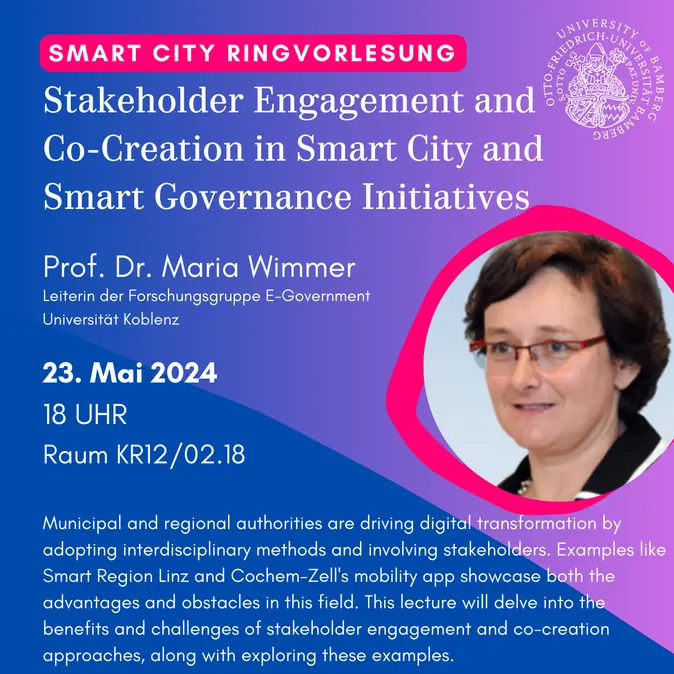Smart City Ringvorlesung: 23. Mai 2024, 18 Uhr ct: Prof. Dr. Maria Wimmer - Stakeholder Engagement and Co-Creation in Smart City and Smart Governance Initiatives
- Beginn: 18 Uhr ct
- Raum: KR12/02.18
The concepts of smart city, smart regions and smart governance have gained substantial attention in research and development since the research topic of smart city evolved around 15 years ago. A number of research and development projects and initiatives have been executed since then, driven by various funding instruments at different levels, which nurtured these concepts and their related technological and social innovations. Also municipal or regional government bodies drive such evolution toward digital transformation and innovation in the local communities. While these concepts are substantially interdisciplinary, involving human, organizational, and technological strands of research and development paired with active engagement of stakeholders and with co-creation approaches have become substantial pillars in the success of such initiatives. However, methodical foundations of stakeholder engagement and of co-creation, co-design and of similar participatory approaches are often challenging. In my presentation, I will review different approaches of stakeholder engagement, smart governance and related participatory concepts, and I will give insights into examples of a) stakeholder engagement along the smart region strategy development in the Smart Region Linz, b) co-creating a mobility application in the rural area of Cochem-Zell, and c) the co-creation approach in developing the central portal of smart rescue and civil protection management in Rhineland-Palatinate. Along with the examples, I will review the benefits and challenges of such stakeholder engagement and co-creation approaches.
Since 2005, Maria A. Wimmer is full professor of Electronic Government at the University Koblenz, Germany, Department of Computer Science. Maria studied computer science at the Johannes Kepler University in Linz (Austria), and she received her doctorate in 2000 and her habilitation in 2003 from the same University. In the period of 1997 – 1999, she was young researcher at the National Research Council (Institute for Psychology) in Rome and Multimedia Communications Lab in Siena (Italy). This period was substantial for shaping her multidisciplinary and system thinking, and for her holistic design approach. In 2004 – 2005, she worked at the Federal Chancellery in Vienna (Austria). Since 2005, she chairs the research group E-Government, with currently a team of 15 doctoral and post-doctoral researchers in the field of digital government. Her main research focus is on designing, implementing and evaluating socio-technical information systems for digital government, including the use of disruptive technologies. Key research encompasses stakeholder participation, holistic design of complex information systems, qualitative data analyses, interoperability, as well as analysis, modeling and simulation of public policy and decision-making based on evidence-based and data-driven as well as co-creative approaches. She is a member of IEEE, ACM and the German Computer Society. Since 2005, Maria is PI or lead partner in a number of R&D projects at European, national and regional level. Examples are PEPPOL, e-SENS, ESPDint, Interplat, Interproc, KleBe.digital / Digital Procurement, on cross-border public e-procurement and interoperability; TOOP and SCOOP4C on the realization of the once-only principle across Europe; OCOPOMO, eGovPoliNet, AI and COVID on data-driven policy analysis and modelling and the use of AI; and BKS-Portal.rlp, Data2Health, EG-DAS, Gov 3.0, NoLa, Smart Region Linz am Rhein and Smart Vinery on leveraging disruptive technologies in digital government and in smart city / smart region. In 2018, Maria was named “One of the World’s 100 Most Influential People in Digital Government” by Apolitical (United Kingdom).
